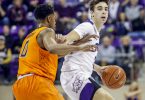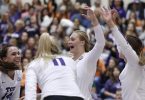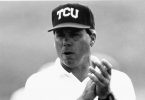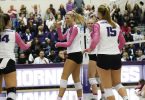When he finishes a start, TCU pitcher Chuck King’s work is often just beginning.
He’s got economic botany waiting for him.
Or biology. Some chemistry, maybe. Could be all three.
“I’m also in my second year of a foreign language,” he said. “That’s been one of my life goals, to speak a second language. I’ve started learning Japanese.”
Oh, so the easy stuff.
The right-hander laughs.
“I’ve had a couple of rough semesters,” he said. ““I’ve had plenty of night games where I come home and study until 1 or 2 o’clock.”
The Coppell athlete is a two-time all-academic performer in the Big 12 even with the exacting disciplines. He’s as proud of his 4.0 GPA as he is of his 2.66 ERA.
“The classroom is no different than the field,” he said. “If you work hard in class every single day and if you take care of business away from the field, it’s going to show up on the field.”
On the field, the Horned Frogs made their own A-plus move when they put the long reliever in the starting rotation three weeks ago. He’s won twice, at Oklahoma on April 6 and at Kansas State on April 19, when he twirled his first complete game.
The 6-foot-5 junior is scheduled to make his fourth start in Game 2 of TCU’s home series against Baylor.
Coach Jim Schlossnagle hopes that King’s insertion will stabilize the rotation and provide a productive, experienced performer to follow Nick Lodolo.
The season rolls on. As does the classwork for the biology major, chemistry minor.
“It’s what I love to do,” King said. “I love doing biology. I love knowing how things work. When I was a kid, 4 years old, I was glued to the Weather Channel for some weird reason. I was taking toys apart and figuring out how they work. So I’ve always had a mind for science — and I’m not good at math, so biology was a good choice for me. The more I go into it, the more I love it.”
What can one do with a biology degree?
Lots, and King has something specific in mind already.
“I want to do medicinal botany — taking chemicals from plants and making medicine,” he said. “That’s just my goal right now. So I’ve been taking a lot of botany courses. I’m in a course right now, economic botany, learning about the economics of plants and their importance.”
Right. The easy stuff.
Then there’s the Japanese. The Foreign Service Institute, which teaches U.S. State Department workers, calls it the hardest language for English speakers to learn because it has more than one set of written characters and the spoken words rely heavily on formal and informal context clues.
“It’s definitely tough,” King said. “The hardest part is the sentences translate backwards from English. You read it backwards, and the grammar rules are kind of weird and you have to conjugate adjectives. It’s definitely a big time requirement to learn. I picked up a book and kind of learned the writing system just to give myself a head start when I figured out that’s the language I wanted to do. Japanese might be a little bit out there. I’ve always had a fascination with Japanese culture. I just really enjoy learning the language and speaking it.”
Hmm, that sounds like it would benefit a pro baseball player in Japan one day.
Maybe, but for King, anything like that is a ways down the line. He intends to finish his education because it was the No. 1 reason he came to Fort Worth. His other choices were Stanford, Duke, Virginia and Vanderbilt.
“I really wanted a good mix — a great baseball program, but also great academics,” he said. “When it came down to it, I grew up in Dallas, I’d still be close to home, my sister is down in Waco playing soccer. And when I came here, we had been to Omaha three straight years. Can’t beat that. It was a no-brainer.”
Indeed, King’s first career victory came at the College World Series, when he pitched 3 1/3 innings shutout innings of relief against Florida on June 23, 2017.
For his career, he’s 6-6 with a 3.76 ERA in 50 appearances, 42 out of the bullpen. His string of three consecutive starts is the longest in his time at TCU.
The Frogs are depending on him on the field. And he’s depending on himself off the field.
“It’s worth all the difficulty,” King said. “So worth it. I wouldn’t enjoy anything as much as doing that, even though I have to pull all-nighters and give up time with friends to go and study. I feel fulfilled because even if baseball doesn’t work out, I always have that backup plan to go to.”







